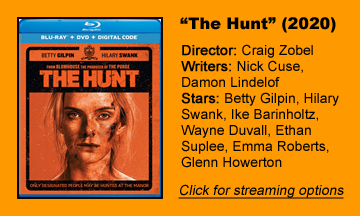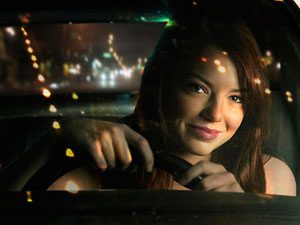I liked “Cabin in the Woods” (2011), but I’m uncomfortable with how it has risen to classic status in the horror genre. Wild genre shifting and brazen disregard for the illusion of fear you’ve created for the audience is eye-opening the first time but it would be an unappealing trend.
Luckily, films like that aren’t the norm, and if “Cabin” shows how they can go right, “The Hunt” shows how they can go wrong.
Goofy tone erases horror
More of a collection of brain droppings than a tight plot from normally reliable writers Damon Lindelof (TV’s “Watchmen”) and Nick Cuse, “The Hunt” starts in “Predators” (2010) fashion with strangers waking up from a drugged stupor, god knows where, for the purpose of being hunted.
Actors such as Emma Roberts and “This Is Us’ ” Justin Hartley pop up long enough for us to think “Oh, they’re in this? Cool” before being dispatched in brutal fashion – but it’s not so bad because it’s CGI, and the goofy tone tells us to not be too troubled.
Director Craig Zobel’s “The Hunt” yanks the rug out from a graspable plotline a few more times before we get to “GLOW’s” Betty Gilpin as Crystal.
Gilpin smartly plays this John Carpenter-esque heroine in an irked, monotone, practical fashion – calm amid the panic of her fellow hunted such as Wayne Duvall’s Don.
While everyone else is dispatched for the sake of the joke of killing off a known actor, or else spouts a stereotypical view for the sake of the unfocused sociopolitical satire, Crystal takes the steps to learn what’s happening and get out. Gilpin’s turn elevates “The Hunt” to almost-watchable mediocrity.
Normal person vs. stereotypes
To be fair to the filmmakers, this probably is not a happy accident. Crystal, a poor but intelligent Afghanistan war veteran from Mississippi, is the “normal” person for whom labels don’t quite stick.
Illuminati-style leader Athena (Hilary Swank) tries to jab Crystal with a misspelling from Crystal’s anti-dark-government screed, but Athena is citing someone else with the same name.
Crystal doesn’t deserve to get roped into this. Everyone else represents a 2020 cultural stereotype; it’s the hidden part of your Facebook feed turned into a character roster. And most lines of (often non sequitur) dialog outline their shallow characterization, like “Why do you need seven guns!?” and “They’re crisis actors!” and “Global warming is real!”
The point from Lindelof and Cuse is well-taken: that Facebook, Twitter and mainstream media punditry form a stupidity chamber. Yet “The Hunt” isn’t a sharp satire; it’s the unleashing of stereotypes for the sake of us looking at them, not for the sake of saying anything.
A common praising of the film is that it skewers “both sides” – meaning modern liberals and conservatives. But a film where almost everyone represents “both sides” and almost no one represents the rest of us is not appealing. Amid “The Hunt’s” “We’re so clever” tone, Crystal is a sanity preserver.



